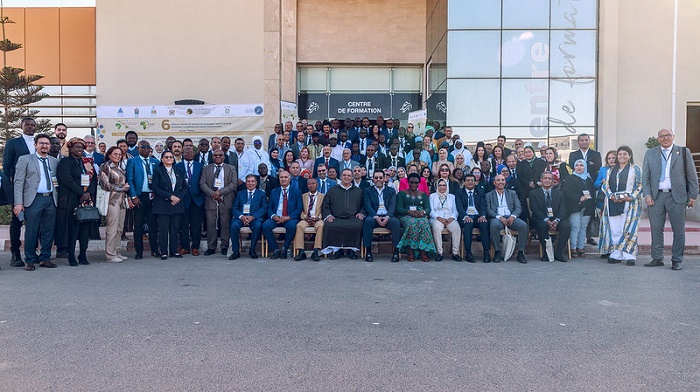Following a series of discussion focused on the challenges related to climate change for local government at the recently held 6th Edition of the African Forum of Territorial Managers and Training Institutes targeting Local Governments (FAMI6 2022), delegates have said that, amid a turbulent context as well as a deep world division generating crises, only 10% of climate finance benefits accrue to the local and territorial levels.

They stated at the annual meeting of Territorial Managers held at the instance of the United Cities and Local Governments of Africa (UCLG Africa) through its African Local Government Academy (ALGA) from November 28 to December 3, 2022, Agadir, Morocco, that the challenges in terms of training and capacity building are enormous and that it is time to act to enable local elected officials and their civil servants to take ownership of climate action, and integrate it into their governance and planning.
The proceedings and contributions led to the following 20 main recommendations, listed to include:
- Need to increase public funding in terms of volume and as a share of adaptation and resilience funding (need to mobilise the $140 to $300 billion needed annually by 2030).
- Need to strengthen and make more coherent the architecture of concessional climate finance, which includes the Green Climate Fund, the Global Environment Facility, the Climate Investment Funds, the Adaptation Fund as well as the concessional windows of the multilateral development banks, as well as the Global Infrastructure Fund.
- Need to become aware of and know how to take advantage of the many opportunities for financing climate action.
- Need to increase local climate finance for localised climate action, to better understand the role of the local and territorial dimension of climate action in Africa, if we are to thrive as a community of nations, with local governments as a driver of sustainable development.
- Need to localise and territorialise NDCs, because everything is done in cities; concrete actions must be taken at this level.
- Need to raise awareness and territorialise political actions related to climate change and involve women and young people in Climate Action.
- Need to give more space and importance to cities in the context of the localisation of the Climate Agenda and put in place mechanisms to facilitate access to international climate finance, because only 10 % of climate finance is found locally.
- The diversification of energy sources (highlighted by COP27, starting from the importance of the mix of clean energies).
- Need to take Africa to the next level and provide incentives that leverage innovations already underway in the region that will have greater impact (e.g. acting for the informal sector and encouraging youth participation).
- Need to prioritise financial innovation (80% of climate finance in Africa comes from public resources) and therefore there is an urgent need to increase private sector finance in climate action.
- A paradigm shift is needed in Africa’s climate narrative; the continent’s current narrative must shift from projecting responsibility and risk to projecting investment and opportunity.
- Need to transform Nationally Determined Contributions (NDCs) and Commitments into clear investment plans with a clear return on investment in the different areas prioritised in the NDCs.
- The urgency of harnessing empirical evidence on key gaps and opportunities to be filled to scale up these successes and create targeted incentives that will need to be applied to enable them to progress.
- Need to increase support for holistic capacity development assessments at the national, subnational, and local levels.
- Need to apply a multi-stakeholder approach by involving a wide range of actors and stakeholders, at all levels of governance (national, subnational, and local).
- Develop long-term capacity building interventions.
- Need to strengthen international, regional and national knowledge networks, platforms, communities of practice as well as peer-to-peer learning and support.
- Developed countries should ensure that more climate finance is available for stand-alone capacity building programmes at the national, subnational, and local levels and to increase coordination among entity capacity building service providers of developed and developing countries.
- Need to invest in conflict prevention through a supportive and facilitating environment.
- Capacity building for the promotion of the Culture of Peace and the art of negotiation.
“We attach importance within UCLG Africa to the efforts of our Academy: ALGA. We will try to follow up on the implementation of all the recommendations that will come out of this important meeting,” declared the President of UCLG Africa, Mrs. Fatimetou Abdel Malick.
The theme for FAMI6 2022 was: “The challenge of training and capacity building of Local Elected Officials and Local Government Staff in Africa in Climate Action”.
Held just one week after COP27, the annual meeting of Territorial Managers was organised in partnership and with the support of the European Commission, the Directorate General of Local Authorities of the Ministry of the Interior of Morocco, the Region of Souss-Massa, the Prefectural Council of Agadir Ida-Outanane, the Provincial Council of Tiznit, the Provincial Council of Taroudant, the Ibn Zohr University and the Training Center of the Faculty of Medicine and Pharmacy of Agadir, the National Agency for the Development of Oasis and Argan Zones (ANDZOA), the National Associations of Local and Regional Governments of Morocco (namely ARM, AMPCPP and AMPCC), the Ecological Transition Agency ADEME of France, the 4C-Maroc Centre, the Office of the United Nations Project on Governance, Directorate of Public Institutions and Digital Governance (DIPGD) of the United Nations Department of Economic and Social Affairs (UNPOG/ DPIDG/ UN DESA), as well as the Ministry of Energy Transition, and Sustainable Development, and the Municipal Council of Agadir.
During the six days of proceedings, more than 300 participants attended the Forum from 40 countries, including 33 African countries.
